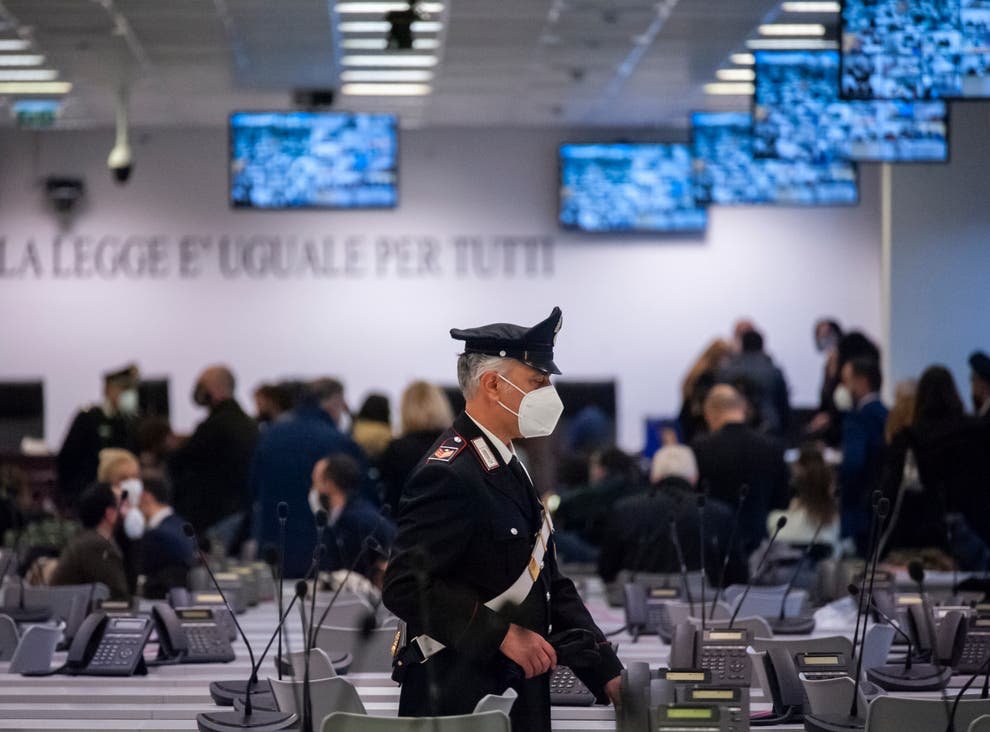The Mafia Trials
An Italian court has sentenced over 70 members of the notorious “‘Ndrangheta” mafia group as they start the biggest mafia trial in decades. The ‘Ndrangheta group rose to power after the 1980s trials that caused severe damage to the mafia families of Sicily’s Cosa Nostra. Often seen as old-fashioned, with wanted members hiding away in the mountains, do not underestimate the ‘Ndrangheta who rake in 60 billion dollars every year due to their criminal activities. The group specializes in the cocaine trade, with it believed that they control eighty percent of Europe’s trade from their base in Calabria. The many other charges facing the felons include murder, extortion, loan sharking, disclosure of official secrets, and abuse of office. Over the next two years, 355 peoplewho have alleged links to the mafia group will stand trial in a case involving thousands of witnesses, hundreds of lawyers, and the most powerful organized crime group in all of Italy. However, despite the involvement of more than 150 families in the group, the trial was focused on solely one: the Mancuso family. The “uncle” of the Mancusos, Luigi Mancuso, and a former senator, Giancarlo Pittelli, will face the longest trials of the 355 defendants as prosecutors look to cut the head off of the snake.
The case will be led by Nicola Gratteri, one of the most respected anti-mafia prosecutors in all of Italy, who has lived in police protection for the past thirty years due to the people he has put behind bars. He had vowed earlier in the year to take the ‘Ndrangheta group down and when asked about the trials after the first 70 had been sentenced, he stated that it had, “gone very well.” Initial trials were held behind closed doors in the city of Lamezia Terme in a courtroom especially constructed for the case due to the colossal size of the case. The judge would end up giving six of the convicts the maximum sentence, asked for by the prosecutors, of twenty years in prison, along with acquitting twenty-one of the defendants.
Other countries are also set to be brought into the mix with ‘Ndrangheta’s heavy involvement in those certain areas such as the UK, who have come under fire for allowing the group to allegedly smuggle billions of euros through London. Between 2018 and 2020, an investigation into ‘Ndrangheta in the region of Reggio Calabria revealed how they had hired a man known as the “Alchemist” by investigators. The “Alchemist” created shell companies throughout Europe in countries such as Croatia, Slovenia, Austria, and Romania before slowly and discreetly moving them to London before closing the accounts altogether. Colonel Claudio Petrozziello of Italy’s Guardia di Finanza, the Italian law enforcement agency, said “the risk of mafia infiltration is underestimated” in London but despite this, Petrozziello explained, the “‘Ndrangheta’s clans had no interest in controlling the local territory, just exploitation of the financial system.” However, this exploitation may not last for long thanks to Brexit.
Due to the recession of shared resources from the EU countries, the UK will become more vulnerable to crime organizations such as the ‘Ndrangheta, Italy’s national anti-mafia prosecutor, Federico Cafiero De Raho, explained. De Raho said that “Now that it has left the EU, problems will start to emerge. London will not be absent, but things will change and even the best post-Brexit cooperation will be less effective than within the EU. Today’s mafias are moving among countries and continents, and where they find weakness in international cooperation, they exploit that opportunity.” Other crime-fighting abilities that have been taken away from the UK are the European Arrest Warrant (EAW), a fast extradition provision, and the European Investigation Order (EIO), a way for empowered countries to call upon a member state to lead an investigation, to track down a suspect, place wiretaps, etc. This is an obstacle that will prevent Non-EU countries from “participating in a team of this sort,” De Raho explained, this, however, is a view the UK disputes, with the government believing their deal with the EU gives them the same powers just not under the same provisions or laws.
Despite the trials’ hopes of getting the communities that the ‘Ndrangheta run back on track, the roots of the ‘Ndrangheta run much farther than what can be seen through just papers and witnesses, as pointed out by Oxford University professor of criminology Federico Varese. He believes that the trial will show how much the ‘Ndrangheta is rooted in the societies they are trying to take them out of. He said on this subject, "It's shocking that you have a criminal group so rooted in the territory you have to put hundreds of people on trial." He continued, saying, "You can throw them in jail but if you don't take away the root causes of why they exist, they'll just reproduce." Leaving many to wonder if the trials will do anything to the ‘Ndrangheta mafia or if it will just be seen as a storm on the surface as they carry on as usual in the depths of the vulnerable communities they take control of.
By Luke Birch

